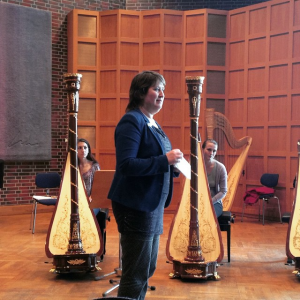Camac Blog
Probespieltraining with Petra van der Heide
News
July 31, 2015
Das Orchester, the German periodical for the orchestral profession (the one with all the jobs in), has a special point of focus in each edition. May’s is “Beruf im Wandel: OrchestermusikerIn der Zukunft”, or “Changing profession: orchestral musicians of the future”. It examines the audition process, what lies ahead financially for orchestras in 2015, and how conservatoire students are prepared for work. The articles are in German, but there’s an English overview here.
Coincidentally, it was also in May that we have been thinking about auditions. Camac Berlin has sponsored two “Probespieltraining” (audition training) courses as part of their Vielsaitig touring project: one in Düsseldorf, one in Rostock, and both with Petra van der Heide of the Royal Concertgebouw Amsterdam.
Once you are inside an orchestra, you can engage with the dynamic issue of your band’s role(s) in society. But to get a job in the first place, you’ll have to play the auditions you’re offered. You will probably do this many times: in Germany, by far and away the country with the most available jobs, one thousand hopeful graduates compete every year for one hundred and fifty vacancies. Nor are auditions famed for their splendid conditions, allowing musicians instantly to blossom into the best they can be. You have to train for them, wisely and hard.
Some people are in a position to do something about the suboptimal elements of the audition process – Thomas Bäurle, for example, of the Staatsorchester Stuttgart, launched a critique of the current system in a symposium in Cologne (January 2015). But for those seeking a job, there is little alternative other than to get on with it. “No ‘ifs’, no ‘buts”, Petra van der Heide told the assembled students in Düsseldorf and Rostock. “No ‘I would have played better if’ or ‘but it is impossible to perform well because’. You will be asked to perform excepts on strange harps, that are in effect unplayable on strange harps. You will be expected to play without warming up. You will sometimes be given useless instruments, and/or treated with scant respect. If this makes you angry, be my guest and lobby for change. I hope that by the time I retire, I will have made enough noise about the audition process actively to have improved it. But for now, this is how it is, and the better you understand this, the better prepared you can be.”
Petra’s audition training covers a broad spectrum of issues. For example: what repertoire you need to prepare, how to prepare it, and indeed how to get hold of the parts, because you cannot just buy the harp part to Acts I and III of Tannhäuser. The orchestral excerpt bible many an orchestral office will still tell you to use is full of misprints, and a conductor will not be interested in hearing that the office told you to use it. Petra also frequently incorporates mock auditions into her training, using unfamiliar harps and forbidding any warming up, to help you get used to this peculiar type of pressure.
We may not be able to throw up ‘ifs’ and ‘buts’ from our lonely benches behind the screens, but the musical community as a whole – and of whom we are all part – does have the power for positive change. Concepts like Petra’s not only help you deal with the realities of the here and now: they also raise awareness for the future. There is, rightly, growing pressure from students on their music colleges to include much more job-orientated training. It would also be good if college and professional associations, and maybe indeed also the State and other funding bodies, would exert growing pressure on orchestras.
Competition is fierce and no orchestra owes, or can give, everyone a living. They could however be much more transparent and accountable about their recruitment processes, which would both help musicians prepare, and the orchestras themselves attract the best talent. The harp world is, in comparison to violin, flute or cello, very small. Yet we still have plenty of nasty audition experiences, and it must be the same, times a hundred, for larger instrumental groups. It is particularly depressing when, despite the ever-more stratospheric level from auditionees, the job remains unawarded, sometimes for years; you ask yourself if they are waiting for King David to walk in, or otherwise what or who is blocking the job. An audition – I learnt reading this month’s Das Orchester – costs on average 17,000€ in extra services paid to the existing members (100 musicians, each paid an extra service or two services of perhaps 170€). A top-calibre orchestra could easily cost several times that. Yes: an orchestra is looking for a colleague to work in very close and special conditions for the next thirty years, and this is to be decided carefully. But with the level as high as it is, is it right that an orchestra spends twenty thousand plus of public money on an audition, appoints nobody (or throws them out after the trial year), does this repeatedly, and nobody asks why?

